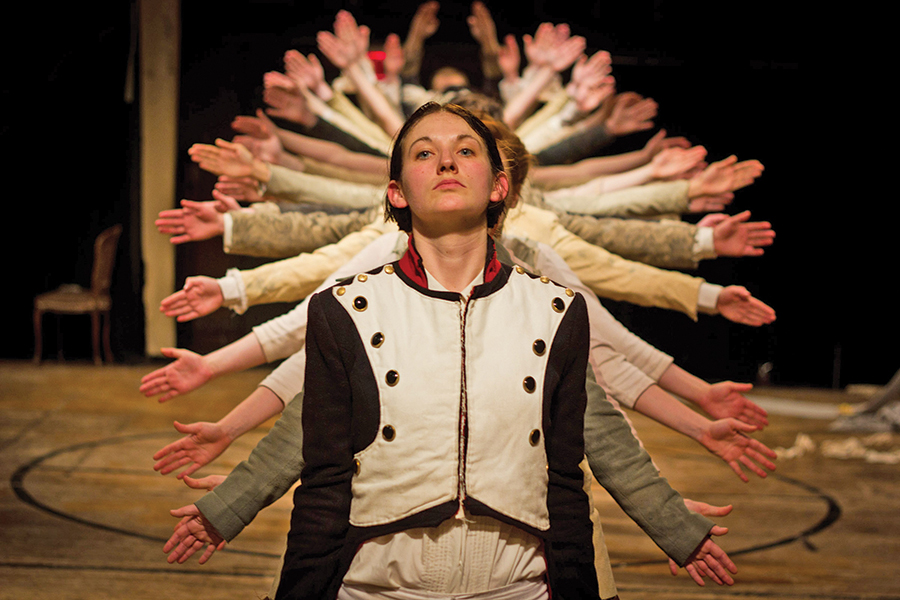There’s radical theater and then there’s Applied Mechanics.
The Philadelphia collective of bold young theater workers and performance artists has been making immersive and transformative work for a decade. That includes 10 audacious productions, a handful of parties and a reputation for combatting racism, homophobia, standard gender norms and misogyny.
This Saturday, all the blood, sweat and tears that members of Applied Mechanics have shed will be on display, complete with a birthday party and retrospective installation with which audiences can interact.
Applied Mechanics occurred naturally and inevitably, a factor that makes the company of more than 150 participants and core members (half of whom are LGBTQ) like a spectral phenomenon or a hurricane bringing art to the stage.
“It wasn’t until we were in performances of the third actual show we created together that the company fully formalized,” said Thomas Choinacky, an AM performer and producer also known for his SoLow festival of brief, homespun works, and his ruminative “Thomas is Titanic” tome.
“We were a collection of artists who were willing to volunteer extra time to assist in building the set and/or willing to send some emails to press. It was a collective of people who believed in our experimental, immersive-theater performance style and also wanted to experiment in co-authorship. No one else was making theater like ours in Philly at that time. So, in the earliest of our shows, there were occasional audience members who thought they could become a part of the show too.”
AM was the brainchild of local theater makers Rebecca Wright and Maria Shaplin before it morphed into a standing company of five artists, including Jessica Hurley, Mary Tuomanen and Choinacky.

Choinacky said the drive and energy of the group remains focused on maintaining a democratically run theater company.
“So, we are five people who have equal say and influence in how the company is steered,” he said. “Yes, certain individuals have more particular skills and so any one person can be a guide to a process, but I am very proud of our dedication to collective, non-hierarchical decision-making on a daily basis both administratively and artistically.”
Choinacky, an out artist, added that Applied Mechanics has long held an LGBTQ focus, since the time of “Portmanteau” in which one of the main characters was trans.
“We also stole and collaged a lot of language from previously published earlier works, so that show included words from Radclyffe Hall [a groundbreaking lesbian writer]. There have been queer narratives from then on. Most recently our show ‘This is On Record’ was partially set in 1988, and my character was a gay archivist who was trying to promote the music of a ’60s lesbian musician [another character in the show]. My character was rewriting a portion of music history in the midst of the AIDS crisis.”
Applied Mechanics continues to reach out to LGBTQ artists and audiences and is dedicated to telling the stories of those who have been marginalized.
“The paradigm of how histories are currently told and whose stories are told will not change unless we set an example,” said Choinacky. “So our work itself is doing this labor to highlight the voices of marginalized identities.”
Choinacky said that, of the shows the company has created, “We Are Bandits” is probably the one that best displays the mission of AM — that “art can be a powerful force in the struggle against nationalism, fascism, misogyny, racism, xenophobia and bigotry.”
“We Are Bandits” was a 2014 show inspired by the Russian feminist group Pussy Riot. It included a wide range of feminist voices, both historical and contemporary, including Angela Davis, Grace Lee Boggs, Frida Kahlo and Voltairine de Cleyre.
“It was important to us to exemplify a radical set of identities and ideas,” Choinacky said. “We also wrote into the show our own manifesto, which included the line: ‘The search for truth and a constant overcoming of oneself, the overcoming of what you were earlier.’ I carry this with me always. In our lives, we are in a constant transformation, a constant learning.”
This weekend, audiences can walk through the Applied Mechanics retrospective, learn about the company’s productions and take a look at props and ephemera from most of the shows.
“As some people have only gotten to know our performances more recently, we thought it would be exciting — and align with our immersive style — to have tactile objects that memorialize our history and people can access,” Choinacky said.
As for the immediate future of AM, the collective is starting a project about middle management — the most stressful position, requiring one to navigate his/her own power and also adhering to the powers that be.
“In this time of unrest, we don’t want to feel hopeless, and we believe that dystopia is not the only possible narrative of our future,” he said. “How can we create alternatives that provide for a future? This work is about collective struggle. We must imagine a world and journey from the long-standing structures of the status quo into the cooperative, adaptive structures of interdependence.”
For more information, visit http://www.appliedmechanics.us/.
